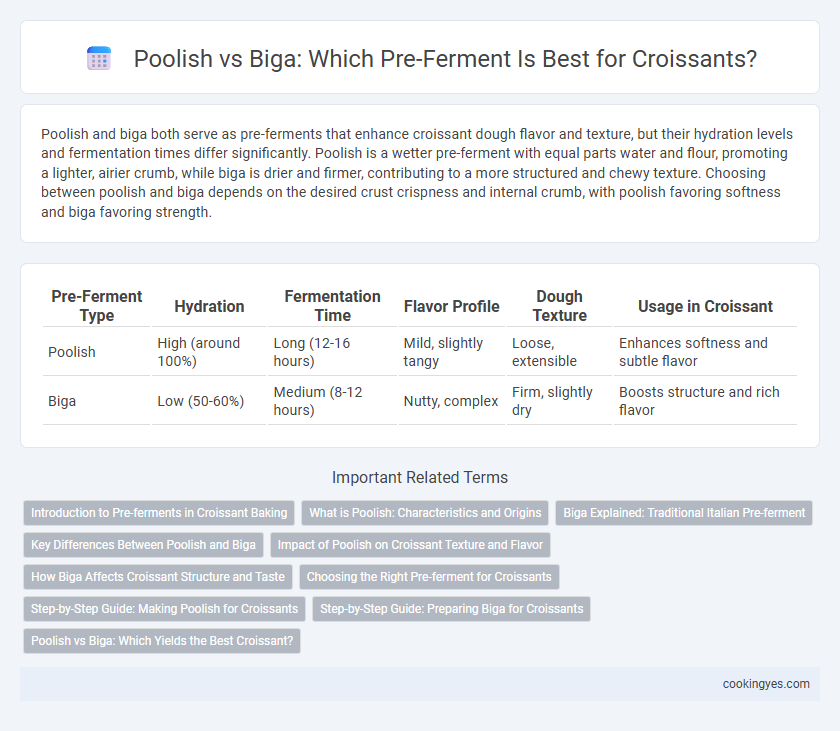Poolish and biga both serve as pre-ferments that enhance croissant dough flavor and texture, but their hydration levels and fermentation times differ significantly. Poolish is a wetter pre-ferment with equal parts water and flour, promoting a lighter, airier crumb, while biga is drier and firmer, contributing to a more structured and chewy texture. Choosing between poolish and biga depends on the desired crust crispness and internal crumb, with poolish favoring softness and biga favoring strength.
Table of Comparison
| Pre-Ferment Type | Hydration | Fermentation Time | Flavor Profile | Dough Texture | Usage in Croissant |
|---|---|---|---|---|---|
| Poolish | High (around 100%) | Long (12-16 hours) | Mild, slightly tangy | Loose, extensible | Enhances softness and subtle flavor |
| Biga | Low (50-60%) | Medium (8-12 hours) | Nutty, complex | Firm, slightly dry | Boosts structure and rich flavor |
Introduction to Pre-ferments in Croissant Baking
Pre-ferments like Poolish and Biga play a crucial role in croissant baking by enhancing flavor development and dough structure. Poolish is a wetter pre-ferment with equal parts water and flour, promoting a more open crumb and subtle acidity, while Biga is stiffer with lower hydration, contributing to a chewier texture and nutty aroma. Choosing between Poolish and Biga influences fermentation time and dough extensibility, directly affecting the flakiness and taste of the final croissant.
What is Poolish: Characteristics and Origins
Poolish is a French pre-ferment characterized by a wet, batter-like consistency with equal parts flour and water, combined with a small amount of yeast. Originating in early 20th-century French baking, Poolish enhances dough extensibility and contributes to a light, airy crumb in croissants. Its high hydration level and fermentation time develop complex flavors and improve dough strength without compromising elasticity.
Biga Explained: Traditional Italian Pre-ferment
Biga, a traditional Italian pre-ferment with a stiff dough consistency, enhances croissant dough by improving flavor complexity and texture through a longer fermentation process. Its low hydration and extended fermentation encourage the development of natural sugars and a mild acidity, resulting in a crispier crust and tender crumb in croissants. Compared to Poolish, which has higher hydration and a more fluid texture, biga provides a stronger gluten structure that supports the laminated layers essential for flaky croissants.
Key Differences Between Poolish and Biga
Poolish and biga are two popular types of pre-ferments used for croissant dough, each imparting distinct textures and flavors. Poolish, a wetter pre-ferment with equal parts water and flour, enhances extensibility and creates a lighter, airier crumb. Biga, on the other hand, is a stiffer pre-ferment with lower hydration, resulting in a denser dough with a nutty flavor and improved structural strength.
Impact of Poolish on Croissant Texture and Flavor
Poolish pre-ferment in croissant dough enhances gluten development, resulting in a tender yet airy crumb structure with a delicate flakiness. The higher hydration level of poolish promotes enzymatic activity that intensifies the buttery aroma and subtle tanginess, elevating overall flavor complexity. This hydrating and fermenting method yields a croissant with increased volume and a refined balance of crisp crust and soft interior.
How Biga Affects Croissant Structure and Taste
Biga pre-ferment contributes to a croissant's structure by creating a denser and chewier crumb with a more open gluten network, enhancing flakiness and layering. It promotes a subtle nutty flavor and slight acidity due to longer fermentation, resulting in a richer and more complex taste profile. This fermentation process also improves dough strength and extensibility, aiding in better lamination and a crispier crust.
Choosing the Right Pre-ferment for Croissants
Choosing the right pre-ferment for croissants significantly impacts texture and flavor, with poolish offering a wetter, more extensible dough that enhances open crumb and mild tanginess, while biga provides a stiffer, drier dough yielding a denser crumb and nutty, complex flavor profile. Poolish fermentation typically ranges from 12 to 16 hours at room temperature, promoting yeast activity and gluten development ideal for flaky layers, whereas biga requires longer fermentation up to 18-24 hours, emphasizing slow enzymatic activity and acidity. Bakers should select poolish for softer, airier croissants and biga for richer, chewier pastry with deeper flavor nuances, balancing fermentation time with desired dough behavior.
Step-by-Step Guide: Making Poolish for Croissants
Poolish for croissants involves mixing equal parts flour and water with a small amount of yeast, then fermenting at room temperature for 12 to 16 hours until bubbly and doubled in size. This pre-ferment enhances dough extensibility and flavor development, producing a tender crumb with a subtle tang. Incorporating poolish step-by-step ensures consistent fermentation, improved gluten structure, and a flaky, buttery texture characteristic of high-quality croissants.
Step-by-Step Guide: Preparing Biga for Croissants
Biga, an Italian-style pre-ferment, enhances croissant dough by contributing a mild, tangy flavor and improving texture through slow fermentation. To prepare biga for croissants, combine flour, water, and a small amount of yeast into a stiff dough, then ferment it at room temperature for 12 to 16 hours until bubbly and aromatic. Incorporating biga strengthens gluten development and promotes better layering, resulting in flakier, more flavorful croissants compared to using poolish.
Poolish vs Biga: Which Yields the Best Croissant?
Poolish and biga pre-ferments significantly influence croissant texture and flavor; poolish, with its higher hydration, produces a lighter, airier crumb and enhances sweetness through extended fermentation. Biga, characterized by lower hydration and fermented longer, yields a denser, chewier texture with a subtle tang that adds complexity to the croissant's profile. Choosing between poolish and biga depends on desired croissant qualities, with poolish favored for softness and biga for a robust, traditional flavor.
Poolish vs biga for croissant pre-ferment Infographic

 cookingyes.com
cookingyes.com